institutional: Girls' participation
News . Events Audio Visual artefacts for communities (SDG 11)
Fonte:Imagem recorte do vídeo Trilhas da Pedagogia – Disponível: IFECast https://youtu.be/RUkKhuhl–0?si=bfo0PIcXU_QVDIzq
Context:
This practice was part of the training of undergraduates in the Pedagogy Course at the Federal University of Cariri (UFCA), which was recently recognized with the highest score by the Ministry of Education (MEC). The course stands out for its interdisciplinary work, through which educators promote teaching, research, outreach, and culture.
This partnership with the Porteiras School began in 2022, due to research developed in the open schooling axis with digital technologies, in the Pedagogy course and a national partnership linked to CNPQ in which UFCA is connected to studies at UFRJ, UFF, PUC-SP, PUC-PR, UNEB, UFSC, and internationally with the Open University, with studies by Alexandra Okada.
One of the first challenges for Pedagogy undergraduates and basic education students was to open their windows. This process encouraged students to reflect on their local context, to investigate the socio-scientific topics that most interested them. Several disciplines were integrated, from the fields of art, technology, and curriculum, as seen in one of the videos from the exhibition of photo-narratives created by Francione Charapa, at IFE/UFCA.
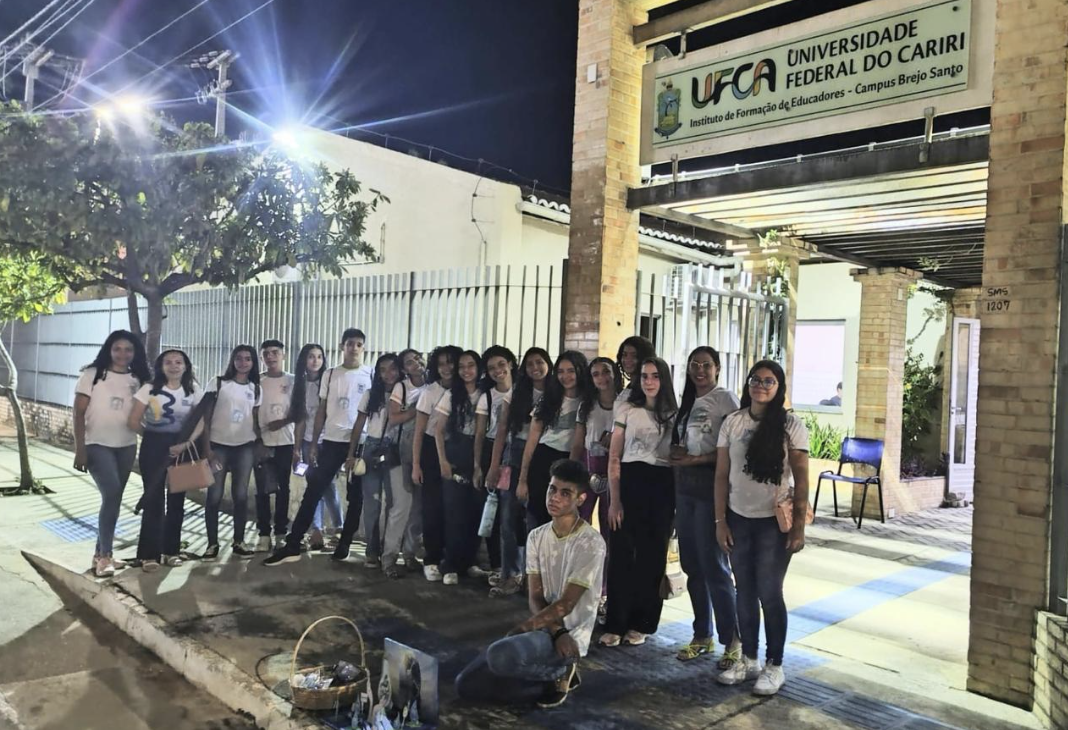
After this journey of opening the windows for pedagogy students, we implemented an action-research project coordinated by Prof. Dr. Karine Pinheiro at Cirene Maria Esmeraldo School, involving research scholars such as Daniel Alberto, Emerson Gomes, Valeria Vieira, Vivila de Carvalho, Elizete da Silva, Luana Argentina, Marielly, and 85 pedagogy students. At Cirene Maria Esmeraldo School (Kessyo Santos, Thais Coelho, Maria do Socorro Silva and the basic education students at Cirene Maria Esmeraldo School in Porteiras), and in the cultural community at the Quilombo do Souza, with Master Maria de Tiê, Cyda Olímpio, Valéria Pinheiro CIAVATA, and Instituto Anjos Digitais. The project continues with the coordination of university extension activities, with the Freirean Movement led by Prof. Darliane Amaral and the appreciation of multiple cultural expressions, which was also supported by the Voices of Cariri Project, led by Prof. Dr. Ligia Rodrigues.
This open schooling community highlights two examples that integrate the use of digital technologies to support the training of educators focused on creative processes through various digital genres, fostering open schooling:
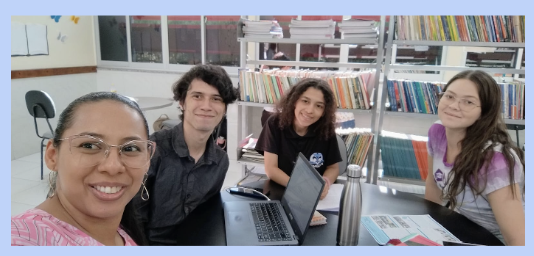
The first example was featured in the Teaching Initiation Program, particularly during the First Meeting of the Institutional Program of Teaching Initiation Scholarships (EnPibid/UFCA) and the First Meeting of the Pedagogical Residency Program (ERP/UFCA) at the Federal University of Cariri (UFCA). Approximately 20 papers were published by undergraduate students, who developed communication skills, teamwork, expanded vocabulary, and a decolonial perspective on the curriculum. As part of the intersectoral integration between the university and schools, 24 workshops and a thematic panel were developed in collaboration with the State University of Bahia (UNEB), alongside Professor Silvar Ribeiro. This connection reinforced the bond between the university, schools, and the community.
The second example refers to activities in a basic education school in the municipality of Porteiras, aimed at analyzing the educational projects developed by basic education students. These projects were aligned with the pillars of open schooling and the development of the C5 Generation (creative, critical, collaborative, communicative, and civic-minded). In both examples, literacy and scientific education were promoted from basic education onward, embedded within a cybercultural context, involving undergraduates, teachers, and students engaged in open schooling.
CARE:
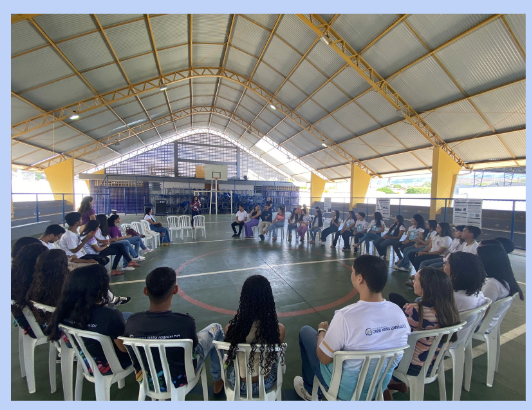
The undergraduate students in the Pedagogy Program at the Institute of Educator Training were involved in research, outreach, and cultural projects tied to real-life themes from their community. These activities occurred both at the university, with courses like Digital Technologies and Pedagogical Innovations, and in basic education schools. Guided by Professor Karine Pinheiro, these initiatives expanded research in basic education and established partnerships between schools, the community, and the third sector, focusing on the creation of school projects using the open schooling approach.
KNOW:
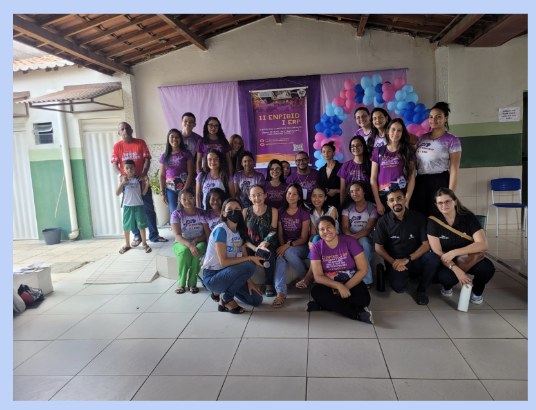
The project engaged digital natives (Prensky, 2010), who developed creative processes through new digital genres, experiencing the power of technology to express ideas in multiple forms. We observed a growing use of video, with students sharing stories, reels, and TikTok videos. Consequently, the cultural practice of using images was intensified with audiovisual production, marked by the multimodal nature of language in the cybercultural context (Santos, 2014). Through various disciplines, students experienced this new approach, incorporating fieldwork where they encountered popular, scientific, and cultural knowledge, all of which had unimaginable impacts on open schooling (Okada, 2016).
In addition, several workshops were designed to map concrete issues and geographic areas using Google Earth to identify locations, aiming for authentic co-learning.
DO:
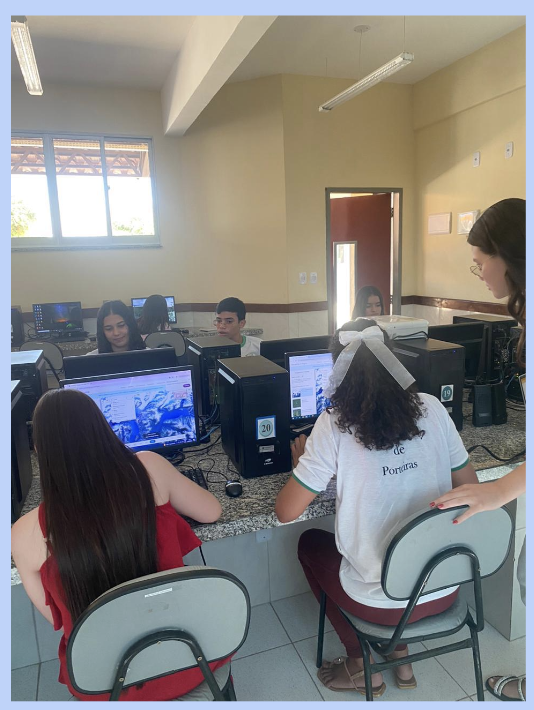
The educational projects developed by students during 2023-2024 involved multiple societal actors, reinforcing democratic practices, valuing diversity, promoting solidarity, and addressing environmental issues. These initiatives fostered autonomy, helping students become active citizens within their community. This process was grounded in the principles of open schooling for the development of scientific education, open access, public engagement, and governance.
Through these activities, students became cultural producers on themes such as solid waste, cultural heritage, water conservation, and animal protection. Another highlighted competence was the expansion of socio-scientific vision. Both basic education and university students presented their projects at scientific events. As a result of this study, we introduce a Podcast Channel with around 1,800 views, showcasing the active involvement of cultural practitioners, who became reflective producers and developed a situated practice through continuous debate. The impact of this activity at the UFCA Brejo Santo campus became “glocal” (Silva, 2005).
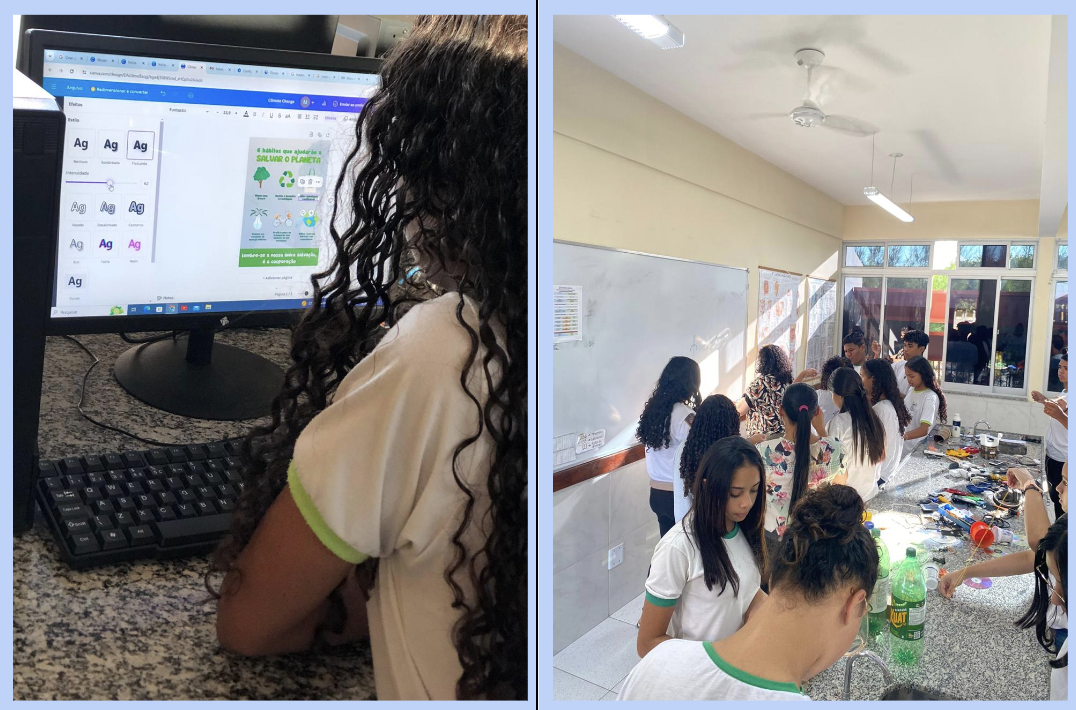
Image – Recycling Workshop and Selective Waste Collection Campaign
Source: Produced by the authors
Results from Teachers (Six basic education teachers from Cirene Maria Esmeraldo Municipal School):
Pedagogical innovation using real, relevant contexts for students related to:
- SDG 15 – Animal protection, solid waste management
- SDG 4 – Cultural heritage
- SDG 16 – Water conservation
Publication of 14 scientific papers: ENPIBID/2023, IV Biology Meeting (IFE/UFCA).
Results from Undergraduate Students – Pedagogy (85 students) and Basic Education Students (Municipality of Porteiras):
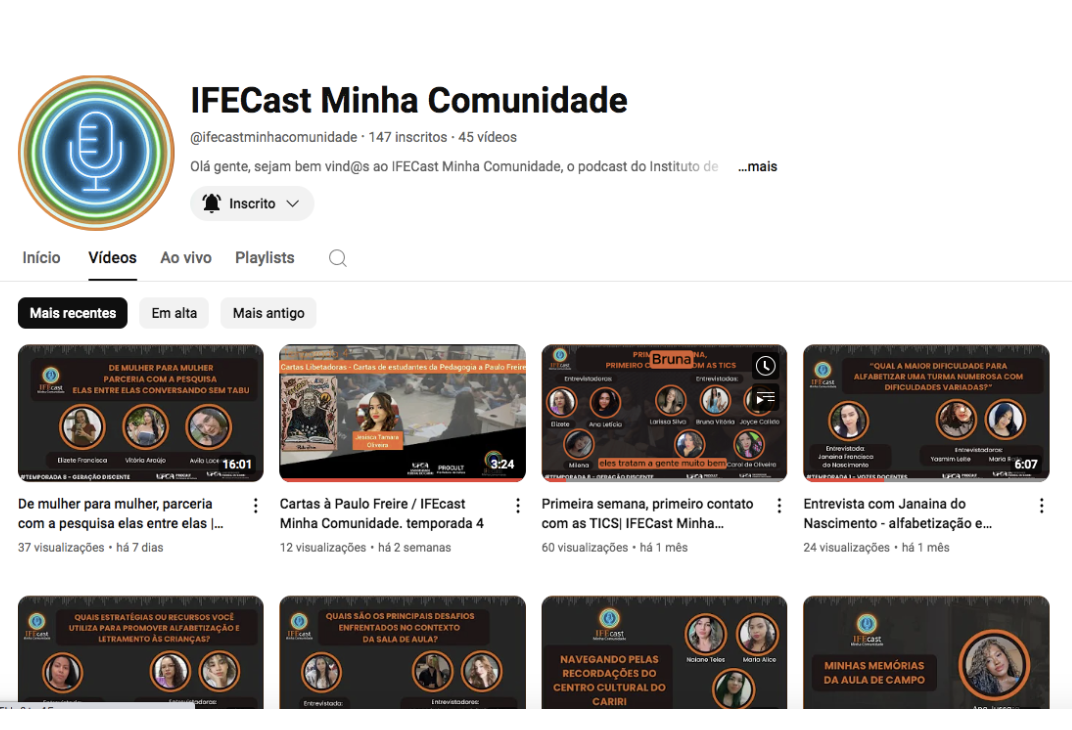
Creation of an educational device – IFECast: My Community, a project involving interdisciplinary undergraduates and pedagogy students. The project involved various pedagogical moments for engagement within the IFE/UFCA community, through open schooling, exploring identity, meaning, and practice. This was facilitated by problematizing their reality.
We share the channel for this C5 Generation of Co-Entrepreneurs – IFECast: My Community, featuring audiovisual narratives about field visits to quilombola communities, environmental trail discoveries, storytelling creation, photo-narrative exhibitions, and interviews that inspired teaching discoveries through diverse digital genres. About 45 videos are available at: YouTube Channel: IFECast: My Community and on Instagram at: @ifecast_ufca.
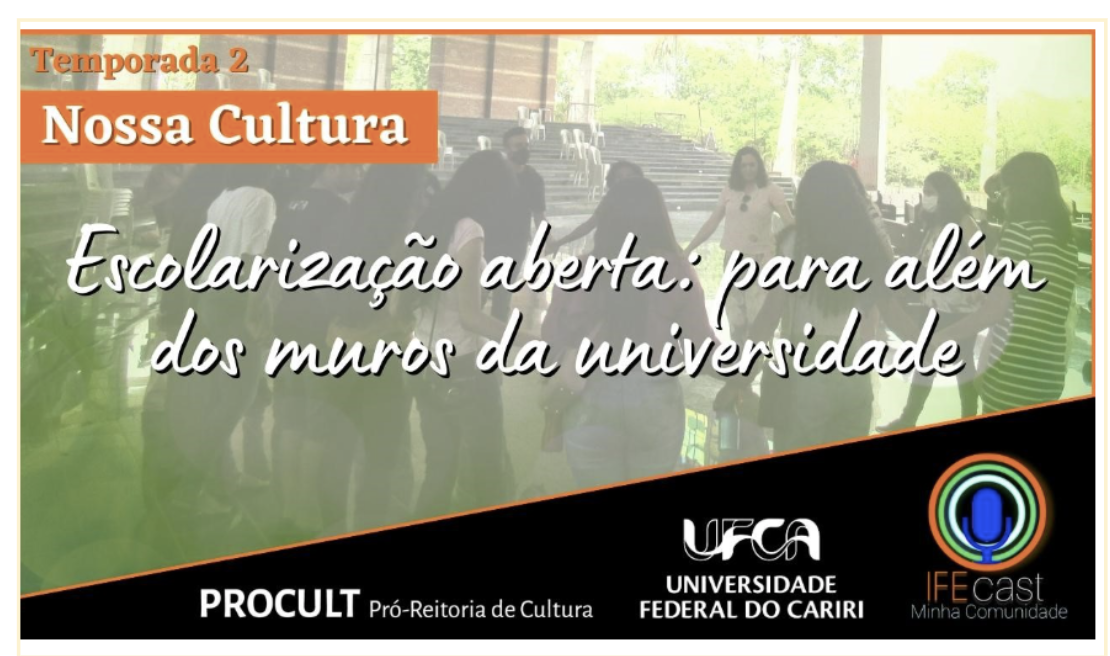
News . Events AR for Health (SDG3)
The central idea of the activity was to spark students’ curiosity by using news stories to connect science content to everyday life. The goal was for students to understand the relationship between the nervous system and the impact of psychoactive substances on the body, promoting greater interaction with their families and extending reflection beyond the classroom. Additionally, students were encouraged to engage with scientists to foster interest in pursuing STEM or science-related careers.
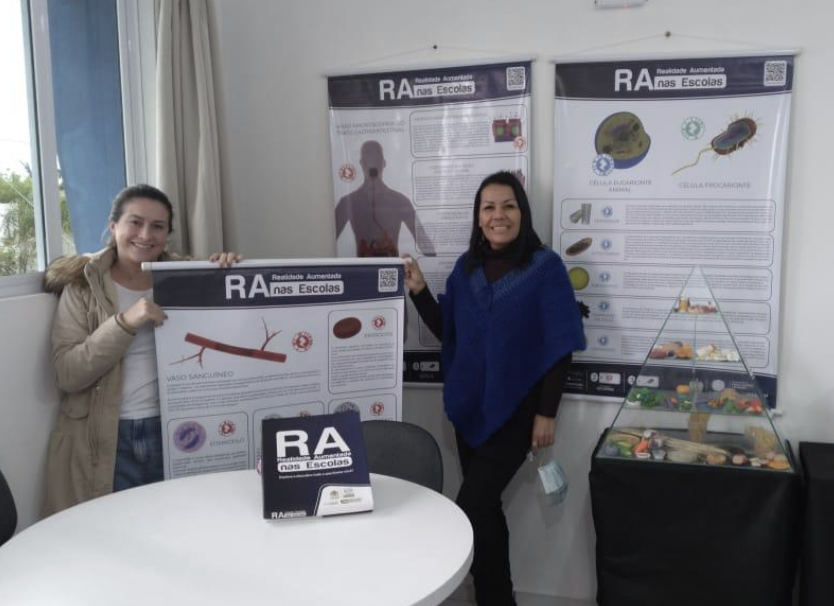
As part of the activities, teachers were given suggestions aligned with the National Common Curricular Base (BNCC), specifically for the 6th grade, within the thematic unit “Life and Evolution.” Among the suggested skills, students worked on explaining the functioning of the nervous system and how it can be affected by psychoactive substances (EF06CI10), as well as justifying the role of the nervous system in coordinating motor and sensory actions based on its structures (EF06CI07).
Throughout the project, teachers had the freedom to apply Augmented Reality (AR) cards as they saw fit, promoting a dynamic and tailored exploration of the content for the students.
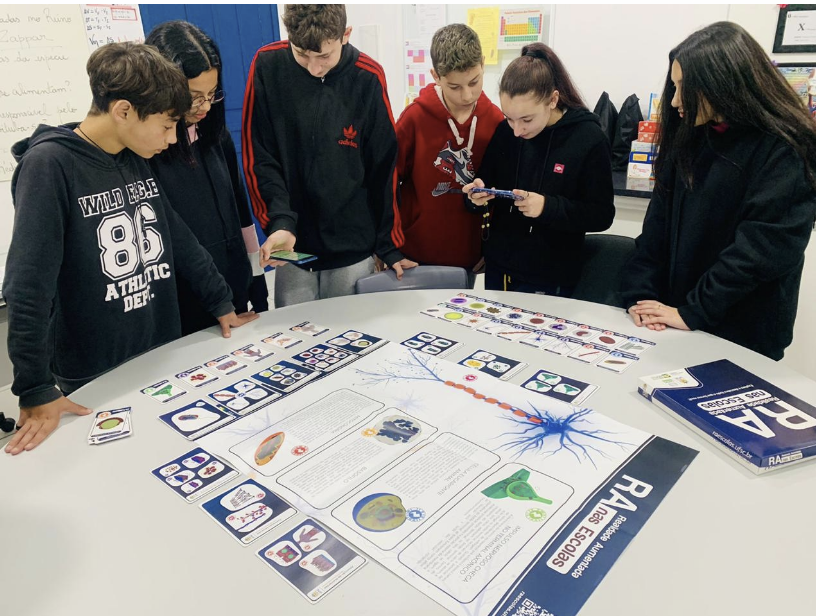
The students participated in a series of activities in three distinct phases, aiming to explore the functioning of the nervous system and the impact of psychoactive substances on the body using AR technologies and interactions with scientists.
– CARE: Students were encouraged to care about everyday issues raised by a news story related to the use of psychoactive substances. They explored how the nervous system can be affected by these substances using AR cards to visualize neurons, axons, and dendrites. This phase piqued students’ curiosity and motivated a deeper exploration of the content.
– KNOW: Students discussed the role of the nervous system in coordinating motor and sensory actions of the body. They also addressed how science can clarify the damage caused to the body by psychoactive substances and discussed the social impacts of substance consumption. The class listed the main problems related to the topic, broadening their understanding of the associated risks.
– DO: Students were encouraged to take the knowledge they acquired to their families. They were tasked with discussing the subject at home and bringing questions and curiosities to the scientists. Families also proposed actions to combat the problems identified in the previous phase, and students brought these ideas back to the classroom in the following session.
In the **Closing** phase, students watched a video with a guest scientist who answered their questions and explained how knowledge of the nervous system is related to their field of expertise. This brought students closer to scientific practice and stimulated their interest in scientific careers. After the video, students completed a questionnaire about the activities and the knowledge they had gained.
Teacher Training: A 60-hour course trained 1,000 public school teachers across Brazil in using augmented reality (AR) content in the classroom. The activities aimed to engage students with real-world questions and problems, encouraging them to explore and acquire knowledge through reflection with AR, as well as through practical actions involving the community and family. These discussions extended beyond the school environment, adhering to the principles of open schooling.
Project Focus: The project centred on:
- Effective Learning: Promoting digital AR skills through exploration, visualisation, discussion, and visual comprehension.
- Inclusion, Equity, and Gender Equality: Enhancing multi-literacy for both youth and adults.
All content aligned with the subjects teachers already cover in class, but with an open schooling approach—addressing real-world issues relevant to students and applying this knowledge in the community.
Safe and Inclusive Learning Environments: Teachers reported that the project significantly enhanced learning environments by offering engaging, immersive, and innovative digital content. Promoting science through digital education aligned with new teaching methodologies for future generations. The project gained recognition from Brazil’s Ministry of Science, Technology, and Innovation.
Recently, President Lula signed the National Digital Education Plan into law. The AR project in schools represents a major contribution to promoting open science, aligning its content with the National Digital Education Plan and the National Common Core Curriculum (BNC
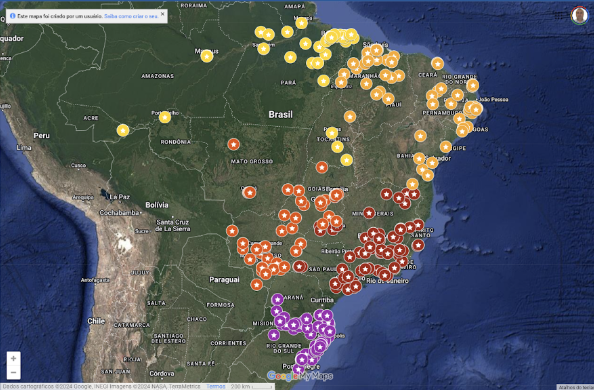
**Teaching Results**
The results showed varying levels of teacher confidence regarding the activities:
1. **Small Group Discussions (A08)**: 83% of teachers felt confident.
2. **Use of Questions for Divergent Thinking (A07)**: 76% of teachers felt confident.
3. **Interaction with Researchers and Scientists (A05)**: 71% of teachers felt confident.
4. **Encouraging Participation in Science Activities Outside School (A04)**: 71% of teachers felt confident.
5. **Promoting Discussions on Science and Society (A02) & Helping Generate Evidence-Based Questions (A03)**: Over 70% of teachers felt confident.
6. **Teaching Scientific Inquiry with Real-World Problems (A01)**: 65% of teachers felt confident.
7. **Encouraging Discussion of Scientific Topics with Family (A06)**: 66% of teachers felt confident, with 24% feeling less confident.
In all activities, only a small percentage (less than 5%) felt very unsure.
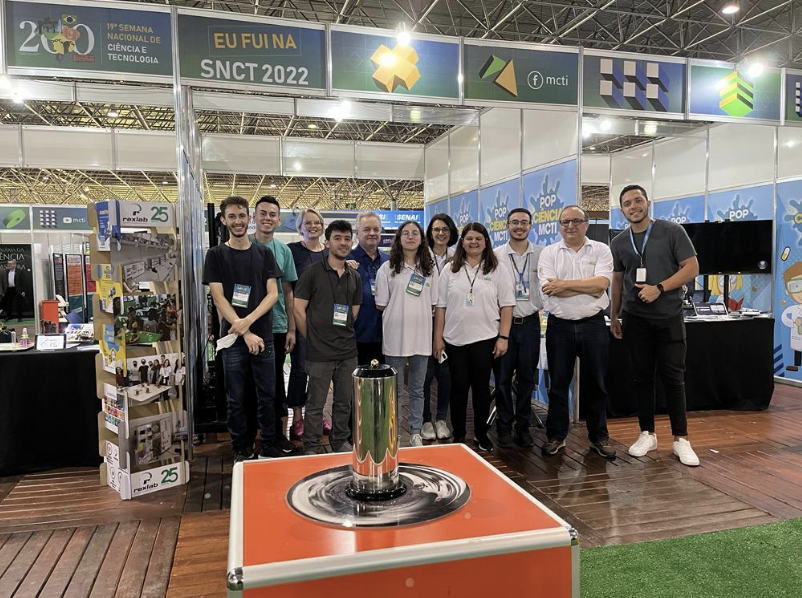
**Learning Outcomes**
Students generally demonstrate a positive attitude toward science and its importance. The vast majority (82%) agree or strongly agree that learning science will be useful in their daily lives. Even more (86%) recognize the importance of science, technology, and mathematics for problem-solving.
There is a strong belief (87%) among students that science helps people worldwide lead pleasant and healthy lives, indicating an understanding of science’s global impact.
However, when it comes to personal confidence in science, the results are more mixed. Only about a third of students (31%) feel confident in their science knowledge, with a similar proportion (31%) feeling confident using mathematics to solve scientific problems. Slightly more students (42%) feel confident using science to generate questions and ideas.
Students show more confidence in their ability to justify views using arguments and evidence, with 43% feeling confident in this area. This suggests that while they may not feel as confident in their scientific knowledge, they have developed some critical thinking skills.
Regarding practical application, nearly half of the students (48%) feel confident in doing science projects with colleagues, family, and scientists. A similar proportion (49%) feel confident talking about science, indicating a willingness to engage with scientific topics.
Encouragingly, the vast majority (80%) of students express interest in doing projects with others using science, suggesting a desire for collaborative, hands-on learning experiences in science.
When it comes to enjoyment and future aspirations, 57% of students find learning science fun. However, opinions are more divided on career prospects, with 42% interested in a job that uses science, and 37% aspiring to be seen as experts in science. These results highlight the importance of integrating engaging pedagogies with the meaningful use of AR for immersive learning across all areas, supporting sustainability goals.
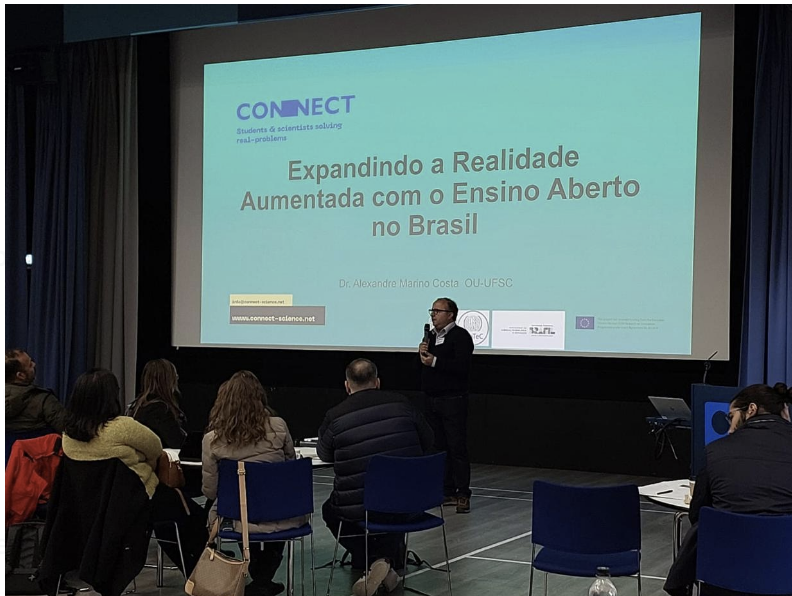
Overall, while students generally recognize the importance and value of science, there is room for improvement in building their confidence and skills in scientific practices. The data suggests that hands-on, collaborative approaches to science education might be particularly well-received by students.
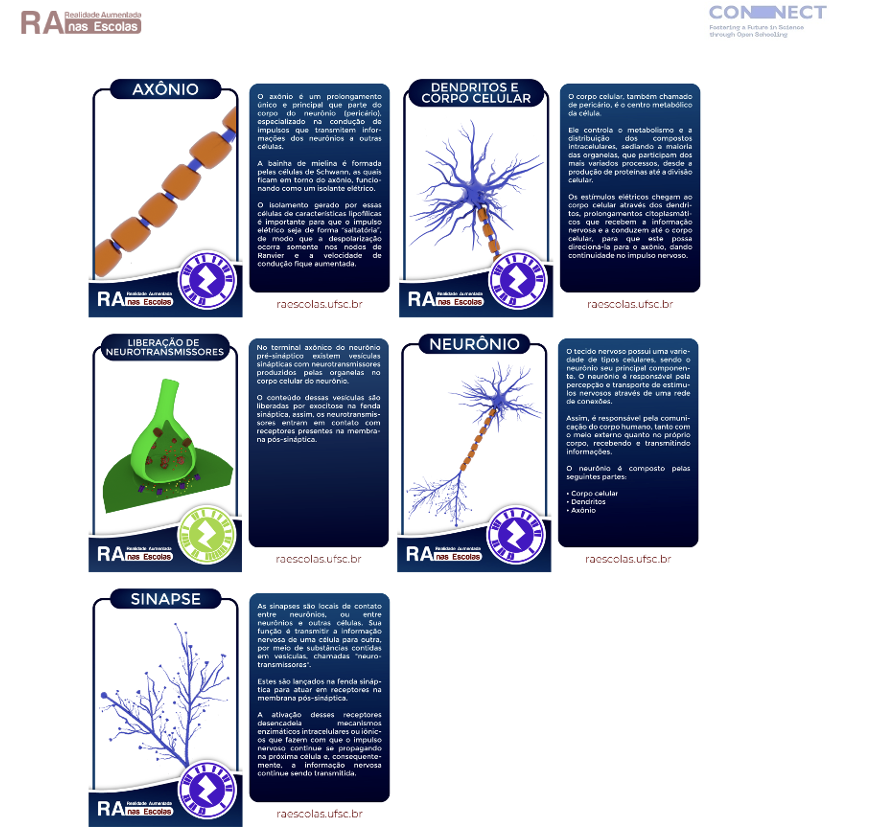
E-artivism played a central role in bridging scientific content with artistic and technological expression. The use of AR cards to visualize the nervous system and the effects of psychoactive substances brought abstract scientific concepts to life in vivid, accessible ways. This approach aligns artistic tools to transcend traditional barriers, making complex ideas more relatable and fostering curiosity. Students were not only learning science but also co-creating visual representations that connected their knowledge to broader social and environmental themes.
The CARE-KNOW-DO framework further supported this e-artivism approach. In the CARE phase, AR visuals sparked students’ curiosity and encouraged them to explore how psychoactive substances impact the nervous system, creating a personal and emotional connection to the topic. The KNOW phase fostered deeper understanding through discussions about the role of the nervous system and the broader societal implications of substance use. Finally, the DO phase transformed this knowledge into action, as students extended their reflections to their families and communities, proposing tangible solutions to combat the issues identified.
Through collaborative activities, such as interacting with scientists and creating evidence-based questions, students became active participants in scientific inquiry and advocacy. These experiences embody the principles of e-artivism by merging technology, creativity, and activism to address real-world challenges in meaningful and engaging ways.
By linking science education with e-artivism, this initiative helped students become confident, collaborative, and creative learners who see science as a tool for positive societal change. The immersive and interactive approach not only improved their understanding of scientific concepts but also encouraged them to take ownership of their learning and apply it to real-world contexts, reinforcing the transformative potential of e-artivism in fostering sustainable development.
Links:
Results
[00:12, 04/10/2024] Students
[01:16, 04/10/2024] Teachers https://openeducation.eu.qualtrics.com/reports/public/b3BlbmVkdWNhdGlvbi02NDc3ZTY1M2IyYTU4MjAwMDhlYjZhODMtVVJfYnlMM3lKSFY0YlBxUkhE
News . Events Digital Inclusion for Equality (SDG 10)
This project was carried out with traditional communities, focusing on digital literacy, sustainable development and solidarity economy. These activities were integrated into local practices of handicrafts and family farming, two key economic pillars for these communities. Additionally, the project emphasized gender equity, giving a voice and space to women, the majority of whom are homemakers, students, and teachers. The participants’ ages and occupations were diverse, including young adolescents in basic education, teachers, and artisan workers. There was also significant ethnic diversity, representing different traditional ethnic groups from Ceará. The project incorporated Sustainable Development Goals (SDGs) 4 (Quality Education), 5 (Gender Equality), 10 (Reduced Inequalities), and 11 (Sustainable Cities and Communities), aiming to bring real and sustainable change to the lives of these communities.
Theme: Digital literacy, sustainable development and solidarity economy were the central themes of the activities. Digital literacy was seen as an essential tool for the participants, allowing them not only to learn how to use technology but also to apply it in their daily realities, especially in strengthening their economic initiatives. The sustainable development and solidarity economy was explored as a collaborative model, where artisanal production and family farming are viewed not just as sources of income but also as forms of resistance and autonomy for these communities.
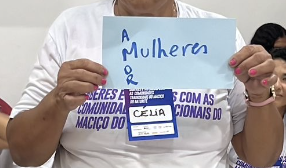
CARE: One of the standout groups was “Trama de Mulheres Pretas” (Weave of Black Women), which has a long tradition in producing handicrafts and local foods. These women faced several challenges in using digital technologies, especially in seeking information, communicating, and promoting their products. The lack of access to technology and initial unfamiliarity with its potential hindered their economic growth and the visibility of their work. However, with the project’s support, they gradually overcame these barriers, acquiring new digital skills that allowed them to expand their networks and reach new markets.
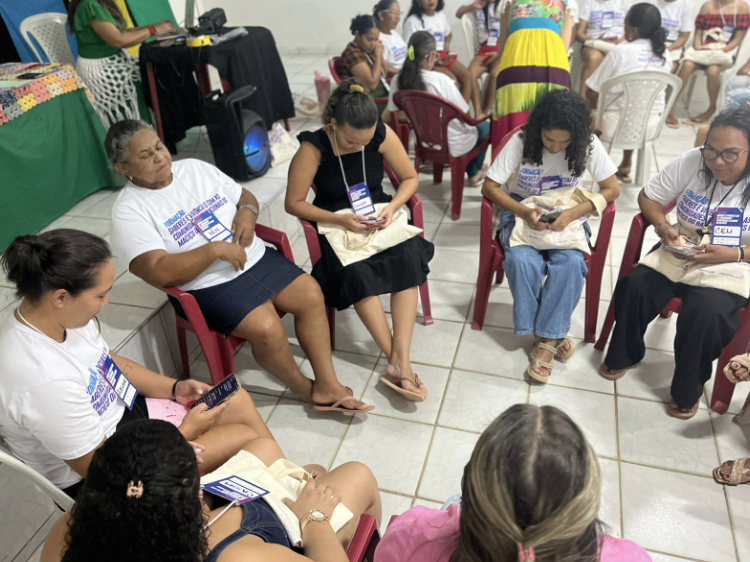
KNOW: Knowledge sharing was one of the pillars of the project, particularly in terms of forming associations and strengthening local entrepreneurship. Through workshops and continuous training, participants developed skills in management, organization, and marketing of their products, increasing their ability to act independently. Furthermore, understanding the dynamics of the solidarity economy was crucial for the women to realize the power of cooperation and self-sufficiency in their communities. They began to see their traditional practices in a new light, integrating them into a broader context of collaborative economy.
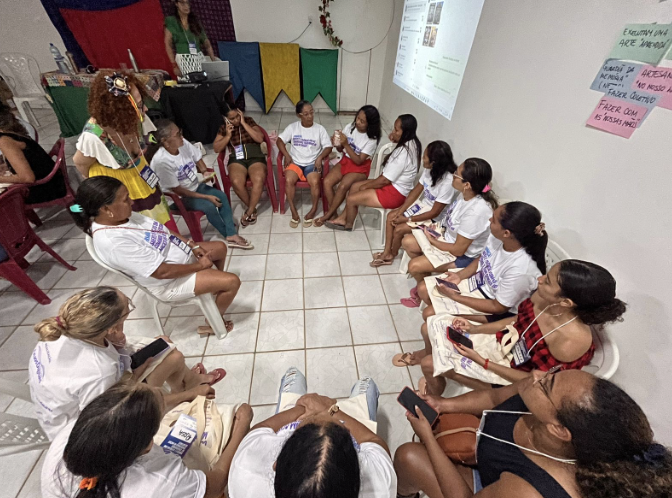
DO: One of the project’s most significant outcomes was the production of videos by the participants themselves, in which they shared their stories, challenges, and achievements. These videos were published on YouTube, serving as a platform for their voices to be heard beyond local boundaries. This initiative not only expanded the visibility of the women’s work but also boosted their self-esteem and recognition of their capabilities. The creation of these videos was an empowering process, where each woman could share her journey of overcoming obstacles and personal growth, inspiring other women and communities.

Impact on Education: The project had a profound impact on how the participating women and their communities viewed education. By addressing local problems collaboratively, the project facilitated co-learning between the women and the facilitators, aligning the training with the challenges faced by the communities. This process resulted in a deeper understanding of the challenges encountered by the women in both personal and professional spheres. The unity and solidarity that emerged from this shared learning strengthened bonds among the participants and generated collective solutions to the problems they face daily.
Impact on Participants: Through observation and active engagement in the project, the women rediscovered the “right to dream” and began to believe in the possibility of improving their lives. Many reported that before the project, they felt limited by circumstances and the few opportunities available. As the activities developed, they started to envision new horizons. One of the participants summed up this transformation by saying, “Today I give myself the right to dream, and I can improve my life.” Another added, “Now I can dream.” The contact with other women involved in the project brought strength and motivation to the trainers, educators, and managers from the NGO Anjos Digitais, as one of them shared: “Being in contact with these women gives me strength. Even though it seems small, it’s enormous for them.” The experience also highlighted the importance of affection and mutual support, creating a space where everyone could learn and grow as equals. “We arrived as equals and co-learned together, on equal footing,” said another participant, reflecting on the spirit of cooperation that permeated the entire process. This feeling of unity and solidarity, through the “CARE-KNOW-DO together,” filled the hearts of the participants with love and energy, empowering them to face new challenges and paving the way for future actions.
The project “Knowledge and Experiences with Traditional Communities of the Maciço do Baturité” exemplifies e-artivism by blending digital literacy, cultural preservation, and storytelling to empower communities and amplify their voices. Through the integration of traditional crafts and family farming with digital tools, participants transformed their practices into acts of advocacy, highlighting the importance of local culture and economic autonomy.
By producing videos to share their stories and challenges, participants used digital platforms as tools for creative expression and activism, expanding their reach and fostering awareness beyond local boundaries. This digital storytelling not only promoted their work but also inspired broader audiences, turning their personal narratives into a collective call for social and economic justice.
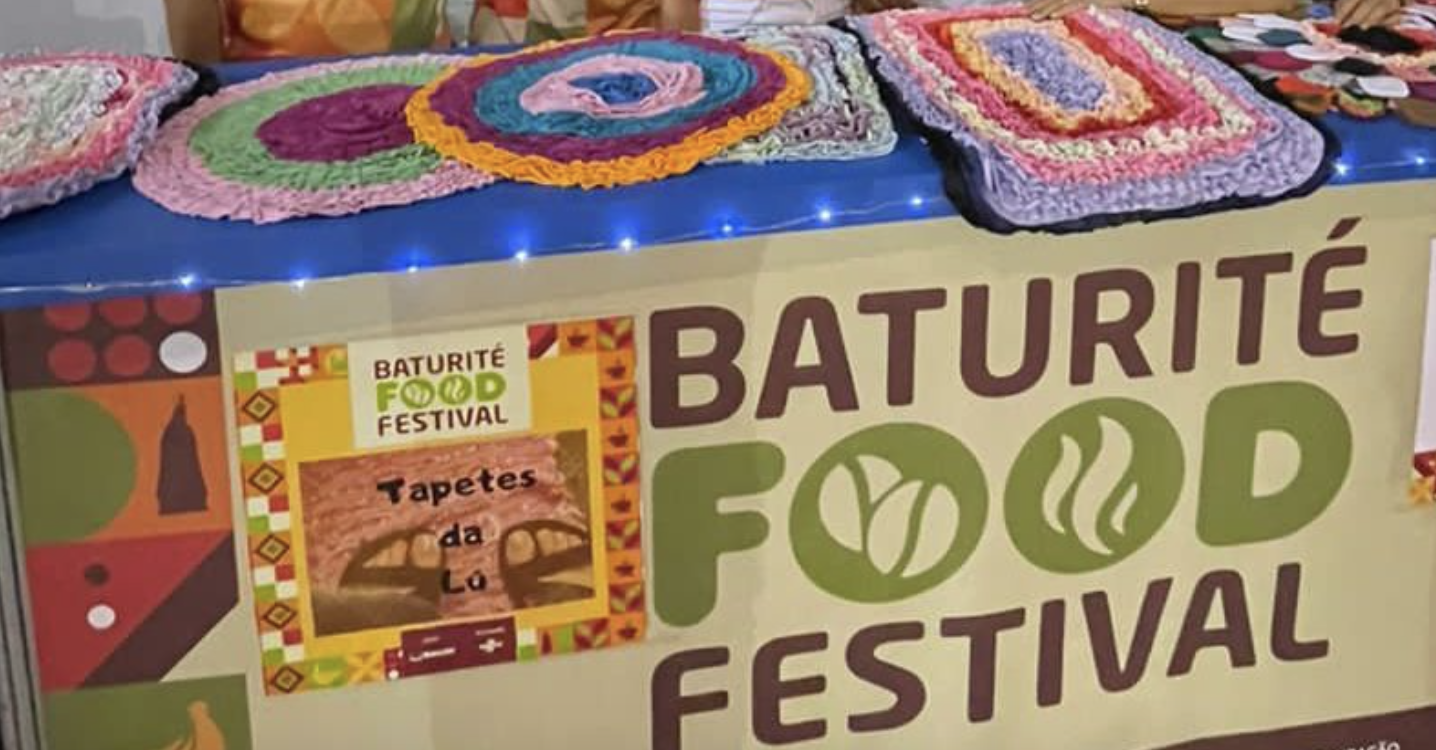
E-artivism in this project bridged traditional knowledge with modern technology, fostering co-learning and collaboration. Participants gained skills that allowed them to actively engage with and address pressing issues in their communities while creating opportunities for sustainable development. This initiative demonstrates the transformative potential of e-artivism to combine art, technology, and activism in creating pathways for empowerment and lasting change.
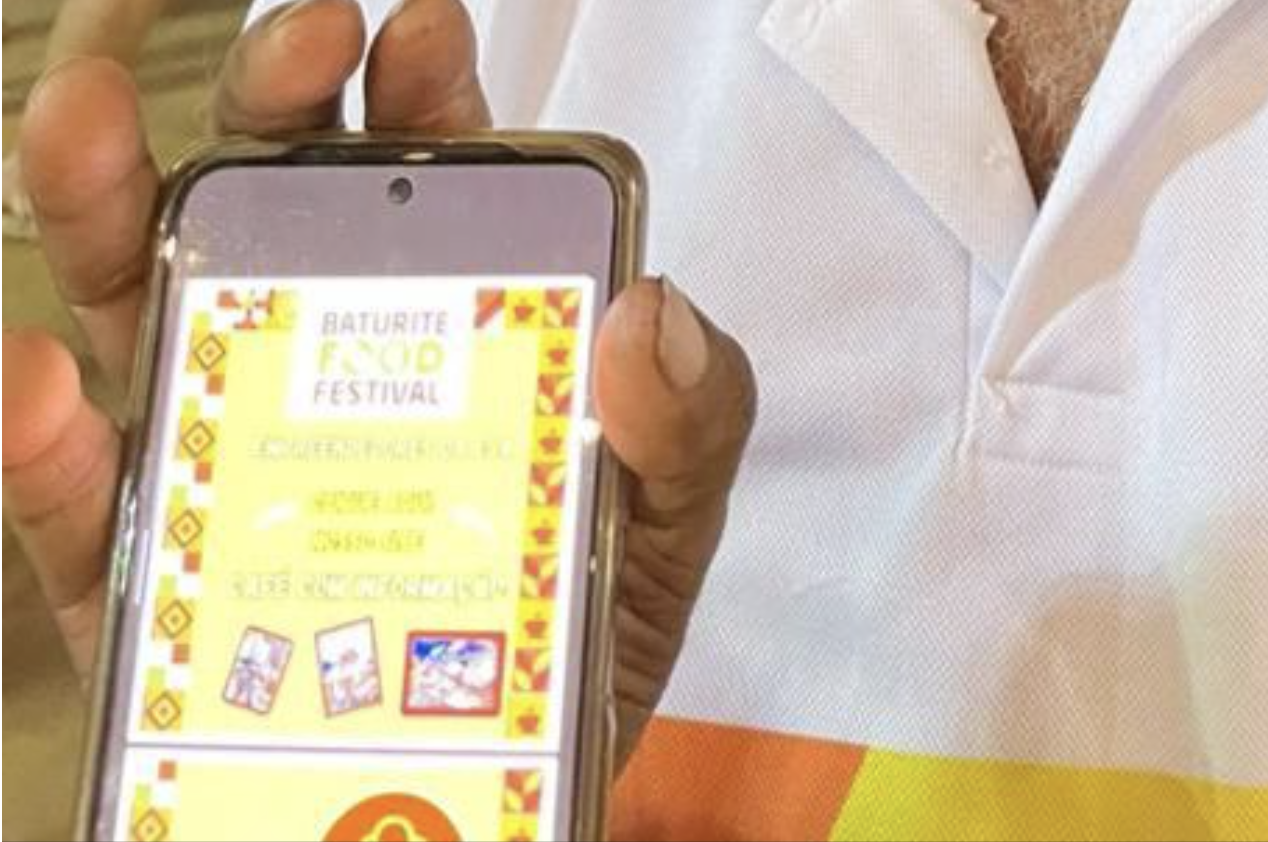
For more details: https://anjosdigitais.org/
News . Events AI for Climate Action (SDG13)
Care:
Greece is dealing with some serious climate issues lately. Students are seeing more heatwaves, droughts, and wildfires, all made worse by climate change. The Mediterranean area, where Greece is, is especially at risk. During the summer of 2021, there were huge wildfires that destroyed forests, homes, and people’s lives. Students considered weather forecasting important for various reasons:
- Disaster Prep: Knowing the weather in advance helps us get ready for extreme events like heatwaves, storms, and wildfires, making them less deadly and damaging.
- Farming: Farmers need weather forecasts to decide when to plant, water, and harvest their crops.
- Public Safety: Forecasts help keep people safe by warning us about extreme temperatures and bad air quality.
- Tourism: Tourism is a big deal for Greece’s economy, and weather conditions can seriously affect it. Good forecasts can make sure tourists stay safe and have a great time.
Know: Students conducted a research project on meteorology, focusing on cloud classification and weather systems. They learned that Luke Howard introduced the three main cloud types—cumulus, stratus, and cirrus—in 1803, and in 1918, it was discovered that weather changes are caused by the interaction of warm and cold air masses.
Do: Using AI, the students classified clouds into 10 subcategories based on altitude. They trained a neural network with photos of different cloud types, testing its accuracy with new images. The project included developing a mobile app for cloud identification and correlating the AI predictions with data from their school’s weather station to forecast local weather
AI for SDG 13: Climate Action
Findings related to the Open Schooling approach: The activities carried out during the implementation of the Connect project were included in the upper secondary curriculum – Information Technologies (IT). We can also mention that the materials provided were useful in preparing and implementing lessons with students. The topic addressed was also relevant and innovative from a scientific and educational point of view, being debated globally. Thus, students had the opportunity to know and experience individually the ways in which they can get involved in predicting weather and support climate action enhanced by Artificial Technologies. Open schooling was found useful for other teachers because students focused on activities connecting various subjects supported by transdisciplinarity approach and an exchange of good practices can be made between teachers who have implemented in different schools who want to join us.
Student achievements: Students were enthusiastic to participate in volunteering and greening activities where they could observe, for example, classification of clouds, how to use drones, and develop a learning machine system trained to examine photos and classifying images. This process helping to plan better interventions for climate change and improve quality of life.
The students involved have formed their scientific research skills, actively participating in the realization of projects and studies on Artificial Intelligence, being able to apply the knowledge learned after going through the support materials coding and using ML for kids tool.
News . Events CONNECT with LVM
Care: Students have been actively involved in scientific and educational activities on plastic pollution, a real-life problem that has a significant impact on quality of life. The students who participated in the activities were from grades IX-XI, aged between 15-18 years, being approximately 85 students participating.
Know: Students used knowledge about plastics discovered in the discipline of chemistry – phases of biodegradation of plastics, chemical composition of plastic, stages of making biodegradable plastic, results obtained by researchers on the period of decomposition of biodegradable plastic in nature, etc. (describe scientific topics). The competences that the students practiced were:
- Brainstorming debates;
- Carrying out individual or team projects through the aspects subject to research;
- Involvement in volunteering and greening activities;
- Discussions on the use of biodegradable materials and their decomposition in nature;
- Analysis of plastics (PET bottle, plastic bags, household bags, etc.);
- Documentation to identify the real situation in the field;
- Conducting information campaigns on the risks of White Pollution;
- Explanation of symbols on packaging labels;
Do: At the end, students prepared posters, posters, thematic drawings, questionnaires, information campaign, research projects. They carried out the activities individually and in teams, being supported by their families, but also by volunteers from non-governmental organizations.
Findings related to the Open Schooling approach: The activities carried out during the implementation of the Connect project were included in the curriculum. We can also mention that the materials provided were useful in preparing and implementing lessons with students. The topic addressed in Year 3 was also relevant and innovative from a scientific and educational point of view, being debated globally. Thus, students had the opportunity to know and experience individually the ways in which they can get involved in preventing and combating environmental pollution. Open schooling could also be useful for other teachers because we can focus on transdisciplinarity and an exchange of good practices can be made between teachers who have implemented in year 2 and 3 and teachers who want to join us.
Student achievements: Students were enthusiastic to participate in volunteering and greening activities where they could observe, for example, the phases of biodegradation, but also connected with nature, helping to protect the environment and improve quality of life.
The students involved have formed their scientific research skills, actively participating in the realization of projects and studies on White Pollution, being able to apply the knowledge learned after going through the support materials.
News . Events Sustainable development through environmental projects
Care: The students were involved and interested in a real-life problem: to what extent the environment contributes to the sustainable development of mankind through planting trees by students, either from saplings or seeds. The students who participated in the activities were of secondary level, aged 11-14 years.
Know: Students used knowledge about sustainable development, environment, food resources and environment. The competences that the students practiced were:
– Analyzing the impact of technology development on the environment and society
– Training the capacity for design, execution, evaluation, use and capitalization of products
– Evaluation of personal resources and formation of initiative and entrepreneurship spirit in career planning.
Do: In the end, students prepared posters and planted trees in the school garden, carried out the activities both in groups and individually, being supported by families and community members.
* Identifying the possibilities of capitalizing on food products of mineral, vegetable and animal origin
*Analysis of links between food production activities and specific trades/professions
– Description of the main resources needed to carry out family production and consumption activities
Findings related to the Open Schooling approach: The activity is part of the curriculum at the school’s decision. It was useful, relevant, challenging, innovative and contributed to the formation of the above-mentioned skills. Open schooling could be challenging for other teachers as it contributes to civic spirit and sustainable development.
Student results: Students were interested in this type of project, because it adds value to sustainable development and environmental protection. They proved pleasure in carrying out practical activities and formed social-moral skills in Open Schooling. The most relevant comment of a sixth grader was: “The world develops from seed and everything is possible through the evolution of science and God’s care.”
News . Events Environmental education – monitoring of protected natural areas in Prahova County
Care: Students were involved, interested or concerned about monitoring the state of forests Protected Natural Area – Plopeni Forest and Glodeasa Forest, a real-life problem, the vegetation state of the forest, the age of trees, the diameter of trees, their height. Students who participated in the activities were 17-19 years old, eleventh and twelfth grades, forestry and natural sciences.
Know: Students used knowledge about forestry, environment, ecology. The competences that students practiced were the ability to use measuring instruments, to correctly determine diameters, tree heights and appreciation of their ages, students’ questions were related to the composition of the forest and the presence of dead wood fallen to the ground that has not been extracted, maintenance of forest roads, information and clarifications that were presented and explained by both guiding teachers and partner representatives, all of which can be found in individual student portfolios.
Do: At the end, students prepared posters, campaign, infographic, video, interviews. They made PPT presentations, portfolios and were supported by families and representatives of the above-mentioned partners, former students of the college.
Findings related to the Open Schooling approach: The activity was framed in C.D.L., in the curriculum. It was useful, relevant, challenging, innovative, interesting and appealing, as evidenced by the attached photos. Open schooling could be useful for other teachers because it has an inter and transdisciplinary character – practical applications, worksheets from the work for obtaining the first didactic degree of Professor Ifrimu Iulia – Apprendre et developper le lexique du domaine forestier: approches didactiques en classe de FLE.
Results obtained by students: Students were curious, pleasantly impressed, attracted by field trips, whose memory created confidence that they will become students of forestry and biology faculties in the future. As an example, one student mentioned: “it is much easier to determine the height of trees with state-of-the-art devices – vertices than with old dendrometers in the school’s equipment” which is relevant and related to their achievements.
News . Events Involvement saves the planet
Care: Students were interested in learning about the negative environmental effects of plastic waste currently choking the planet, plastics disposal scenarios, and the advantages of using bioplastics over conventional plastics. Students who participated in the activities are aged 17-18, twelfth grade, 26 in number, basic field: natural resources and environmental protection.
Know: Based on the knowledge gained and by solving the tasks in the worksheets presented in the project, students developed skills of analysis and awareness of the negative effects of plastic on the environment and offered the opportunity to propose ways to reduce pollution with this type of waste.
Do: In the end, students made informative leaflets about the negative effects of plastics, drawings and models about the need to reduce plastic use, thematic articles in the school magazine. Family members were also involved in the activities, together carrying out activities to reduce pollution and raise awareness of the transition from linear plastic consumption to circular consumption.
Findings related to the Open Schooling approach: The activity is framed in the curriculum, within the environmental protection module, according to the qualification of the class that participated in the project. It was a challenging activity, which managed to actively involve students, families and members of the local community in collecting a large amount of plastics at school level, and from its capitalization was purchased planting material for the green space of the school. Open schooling could be challenging for other teachers as it provides opportunities to raise awareness of the need to reduce plastic use and build an environmental awareness that it passes on to students.
Student results: Students were actively involved and challenged in obtaining bioplastics from corn starch, acetic acid and glycerine and in selectively collecting a large amount of plastic mass. As an example, one student mentioned, “If we all use so much plastic and don’t stop, then we’re going to suffocate the Earth as fast as possible.”
News . Events Actions to reduce the carbon footprint
Care: Students were interested in finding out new information about pollution, they actively participated in the lessons on Carbon neutral proposed by the CONNECT project, a real-life problem “carbon footprint” was highlighted, each student made their own calculation and realized the importance of reducing it. The students who participated in the activities were in the eleventh grade the branch: technological, profile: technical, basic field: natural resources and environmental protection, qualification: ecological technician and environmental quality protection, 18 in number.
Know: Students used knowledge about environmental pollution through combustion reactions, identified where carbon dioxide emissions come from, from different activities: transport, energy production, agriculture and different industries. The competences that students practiced were: identified problems, applied knowledge about Earth’s atmosphere and global warming, developed teamwork skills, played the role of journalist, politician, architect or construction engineer, developed calculation skills, considered different perspectives for reducing carbon dioxide emissions and proposed solutions through the role they played, have developed skills to consider the economic and social consequences of environmental pollution.
Do: At the end, the students prepared different materials: posters, drawing – green house, report made by the journalist, article proposed by the researcher (scientist), article proposed by the politician regarding laws that will be applied to reduce pollution. They carried out the activities in groups of 3 to 4 and were supported by families.
Findings related to the Open Schooling approach: The activity is framed in the curriculum to the qualification of the class that participated in the project.
It was very useful, the lessons were held during the green school week, students received rich and useful information through this project, they were also put in the situation to look for information and propose solutions to reduce the carbon footprint, to be involved and useful to society.
Open schooling could be useful and challenging for other teachers because each of us carries a carbon footprint and we need to act to reduce it. The teacher must be a positive role model for the students.
The results obtained by the students: Students were happily involved in activities, developed different skills, confidence in science, sought solutions to problems related to environmental pollution with carbon dioxide, provided positive feedback at the end of the activities. As an example, one student mentioned the following conclusion: “the carbon neutral approach is essential in combating climate change, it is important to recognize examples that demonstrate genuine commitment and concrete actions in reducing greenhouse gases.”
News . Events STOP – FOOD WASTE!
Care: The students were interested in a real-life issue related to responsible food consumption that represents a conscious food choice, taking into account aspects related to our decisions regarding health, environment, economy, culture, etc. Carrying out social responsibility activities plays an important role in how participants will understand why making any decision about personal food can have negative consequences / irreversible on an important part of our planet. . The students who participated in the activities were students aged 3-18, from preschool, primary, secondary and high school. A total of 825 students participated in these activities.
Know: Students used knowledge about food waste by watching documentaries on the effects of food waste, conducting a case study at economic agents in the city – 3 restaurants, by visiting the bread factory in the city, making leaflets with information through which we can reduce food waste, making a trophic pyramid, healthy breakfast and making figurines of fruits and vegetables, drawing up posters.
The competences that the students practiced were:
- Motivating students to adopt a balanced and economical lifestyle;
- Encouraging students to find practical and effective ways to reduce food waste;
- Developing interdisciplinary connections to draw public attention to food waste;
- Changing the attitude of students, their families, school teachers towards food waste.
Do: At the end, students prepared posters, leaflets, posters, interview, video. They carried out the activities in groups but also individually, being supported by family and community members.
Findings related to the Open Schooling approach: The activity was framed in the curriculum. It was challenging and useful because students’ confidence and self-esteem increased as a result of participating in complex activities that highlighted their abilities and required them to make decisions. The improvement of social skills was reflected through cooperation at the level of working groups and students’ roles in this context, through the relationship with colleagues in school. Open schooling could be challenging for other teachers because it increases creativity levels among both teachers and students.
Results obtained by students: Students were interested in the topic proposed for research and showed interest in participating in other activities aimed at the practical and applicative character of the given topic
News . Events Let’s get active for mental health
Care Stage: Students did introductory activities on mental health. A total of 75 students participated.
Know stage: During participatory research in which they detected their needs and designed an action plan with various activities. They put mental health knowledge into practice and expanded it.
Stage Do: The activities were designed to be carried out the next course, we lacked time to do this stage.
Results related to the Open Schooling approach: Undoubtedly, participatory research has allowed them to treballar competències i sabers inclosos en el currículum de 3r d’ESO, però també d’altres que no hi estan directament especificades.
Support for the implementation of educational resources by: the department and the Living Lab of IrsiCaixa
Student results: The students were able to integrate certain knowledge and skills. Still, if we had given more time to conduct participatory research, the results would have been more satisfying. The students actively participate in the dynamics proposed to them.
News . Events In the CFGM of Pharmacy we promote our mental health
Care Stage: The students of the CFGM of Pharmacy made an analysis about health and its three branches and were very interested in working on the promotion of their mental health during their stay at the educational center. A total of 38 students participated in two groups (morning and afternoon).
Know stage: During the participatory research phase, during which they identified their needs and devised an action plan, students utilized their knowledge of mental health and habits. Additionally, they actively applied skills such as planning, organization, information retrieval, self-directed learning, and the application of acquired knowledge.
Do stage: Students conceived and implemented a mental health promotion action plan comprising four distinct activities. It was the students themselves who lead the sessions at the classroom.
Results related to the Open Schooling approach: Undoubtedly, participatory research has allowed them to not only develop the professional, personal, and social skills outlined in the curriculum of the CFGM Pharmacy and Parapharmacy but also provided them with the opportunity to enhance key cross-cutting skills essential for their future profession, such as autonomy, work organization, responsibility, and teamwork. Certainly, the inclusion of social actors in this research can further facilitate the cultivation and acquisition of these competencies and knowledge.
Support for the implementation of educational resources by: head of department
Student results: The students enthusiastically embraced the proposal and eagerly accepted the challenge to participate. We believe that this initiative has served as an excellent opportunity to shed light on the significance of mental health issues among young people. Simultaneously, it has enabled us to foster certain skills among the students through the application of scientific methodology throughout the entire process.
News . Events Open Schooling for mental health promotion
Taking care of young people’s mental health is a necessity. Schools are a fundamental part of their lives, so we could promote their emotional well-being. This year, we have implemented Healthy Minds, an Open Schooling project within the framework of the European project CONNECT, which aims to promote the mental health of students through a participatory research process. Another objective is to raise awareness that science and the scientific method can be useful in solving the challenges we face as a society and to abandon the idea “I’m not into science” that we often hear in the classrooms.
At the Caterina Albert High School in Barcelona, we have implemented Healthy Minds with a group of first-year baccalaureate students in the context of the subject of Scientific Challenges. During 2 sessions, we have conducted an analysis of the group members’ needs regarding mental health and prioritized them through a consultation process. We have designed and implemented an action plan based on various activities that address the prioritized needs, and we have evaluated the process and the learnings acquired regarding mental health and everything related to participatory research methodology. During the process, we had planned to involve families, but motivating them to participate has been a challenging task.
The results of implementing Healthy Minds in our school are still in a very early phase, although they reflect an increased awareness among students about the importance of promoting mental health. They have begun to integrate participatory research as a process to solve problems that affect them in collaboration with other stakeholders, and they have designed an action plan for the promotion of mental health. The activities that have been carried out are few, and we will evaluate how to implement it further in the coming school year by involving more stakeholders and incorporating it into the Educational Project of the school.
News . Events Mapping my school
Care: Students were interested to find out if their school can be accessible in other persons with disabilities, a real-life problem that occurs due to the old building where the school is located. Students who participated in the activities were 24 boys and girls of age 13-14.
Know: Students used knowledge about maps (general and thematic). The skills that students practiced were to create specific questions about the access in the building, to analyze the data, to create maps with the arcgis software, to discuss their findings and to write the conclusions of their study.
Do: At the end, students were worked in small groups of 3 or 4 persons, prepared maps, create a story map, participated in a Greek Contest “Χαρτογραφώντας την προσβασιμότητα” and present their findings in the Greek Students Conference of the Connect project. They supported by their families and the local community of the school.
Findings related to Open Schooling approach: The activity fitted in the curriculum. It was useful for our class of geography because students create their own maps. It was also innovative due to the real problem of the access in the bulding of school . Open schooling might be helpful for other teachers because students learn by doing themselves.
Change/innovation supported by: [ x ] schoolhead [ ] school association/network [ ] local government
[ ] Other: _________________________________________
Students’ Outcomes: Students were create maps and a story map that includes all their work. A group of students participated in the Greek Student Conference for the Connect project and they feel confidence about the project. As an example, a students mentioned ” I enjoyed so much to participate in the Greek Students Conference!”, “ I like to create my own map, I can learn by myself what are the important elements of a map.”
This practice contributed to increasing:
[ x ] families’ engagement in science [ ] girls’ participation in science. [ ] students’ science careers awareness
Please justify: The school faces real problem as concerns the access for persons with disabilities. Students discussed with their families what they can do and what are the solutions in order to reduce this phenomenon.
News . Events Investigation of potential sources of pollution on Lefkada by students of the 2nd Experimental Lyceum
Care: Students were interested in and investigated the special characteristics of the island through the online collection of data on the natural & technical environment of Lefkada’s island. The pollution of the natural environment, especially the coastal shores is a real-life problem where in many cases, the natural environment can be turned into an unjustified receiver of pollutants by local and tourist activities. This could negatively affect the island’s natural environment in the future. The students who participated in the activities were twenty-one (21), male and female students of the A and B Grades of the 2nd Experimental Lyceum of Lefkada, aged 16-17.
Know: Students used knowledge about of Natural Sciences such as Biology, Chemistry, and Physics. Biology was used as a basis for understanding ecology and ecotoxicology. The skills that the students practiced were multiple such as:
- Investigative method (inquiry-based learning) with question definition, research design, research conduct, results, resulting in the strengthening of students’ scientific thinking.
- Application of scientific methodology and utilization of environmental science elements.
- Cooperation with the scientific and local organizations of the island related to the environment.
- Collaboration with universities and research institutions for information exchange.
- Use of ICT (Information and Communication Technologies) to visualize the natural environment of Lefkada through the Google map and FILOTIS – Greek Nature Database, using the iNaturalistGR database.
- Investigation and presentation of the work plan (development of critical thinking, creativity, communication).
Do: At the end, the students prepared an electronic informational material which they posted on the school’s website. This was after a metacognitive evaluation of the data on Lefkada’s geophysical characteristics and the potential areas of pollution on the island. They also published an article in the school newspaper about the natural environment of the island. In the article, the students proposed ways to protect the environment, especially in the summer months when tourism increases. With the help of the Biology teacher in charge, the
students created a poster that refers to their actions in relation to the study of biodiversity and the study of potential pollution areas on the island of Lefkada. In addition, the students’ work was presented at the annual event of the Excellence and Creativity Clubs and activities of the current school year 2023, at the 2nd Experimental Lyceum of Leukada. The President of the Governing Committee of the Model Experimental Schools, Mr. Tombras, the mayor of the city, teachers, representatives of local agencies, and students of the school were invited to the event. They completed the activities as a group and were supported by their family, and their classmates by sharing good practices and ideas. The parents were especially supportive of the students as they helped them search and record reports on the pollution phenomenon, twenty years ago on the island.
Findings related to Open Schooling approach: The activity was fitted and adapted to the curriculum as it combined chapters from Natural Science courses including Biology, Physics and Chemistry. The activity is an innovation in education because through it students can use scientific data and elements to solve problems in their daily life, such as issues of ecological balance and environmental pollution (decision-making ability). The purpose of this activity is the cultivation of citizenship, where students, as tomorrow’s citizens and/or bioscientists, are called upon to make decisions about the environment, health, safety, and, in general, about any category of challenge that will arise from the applications of Biology/Ecology in our society. Open schooling might be both useful and challenging for teachers because it promotes students’ active participation by creating learning environments that will be governed by the principles of modern teaching methodology, such as inquiry learning and experiential and communicative approaches, encouraging critical thinking and creativity.
Change/innovation supported by: [X] schoolhead [X] school association/network [X] local government
[ ] Other:
Students’ Outcomes: The students initially showed a great interest in getting to know the natural and artificial environment of their island. In the Informatics laboratory, they watched a video showing the natural environment of Lefkada such as habitats, lagoons, and mountains combined with the human-made environment i.e. houses and tourist accommodations. The online Webex communication with the scinetist Dr.Vasilios Drosos, professor of the Department of Forestry and Environmental and Natural Resources Management of the Democritus University of Thrace, excited the students because they were given the opportunity to answer their key questions about pollution and the environment and to participate in a discussion as responsible and active members of an action. Students, as the most dynamic part of society, were receptive to learning during the seminar. This created a climate of mutual trust and interaction between the scientist and students. Furthermore, the students were excited about the use of google map, iNaturalist database and Filotis database for mapping and locating cities of Lefkada with a greater percentage of pollution with the use of software even though they were initially cautious. Some of the students mentioned “Is it possible that the software we find very easily on the internet can provide us with such a large amount of information?”, “Can we also map the other islands in the Ionian Sea?”.
This practice contributed to increasing:
[X] families’ engagement in science [X] girls’ participation in science. [X] students’ science careers awareness
Please justify: The contribution of the students’ families was decisive in the success of the activity. This is because they helped the students search and record reports on the phenomenon of pollution twenty years ago on the island and compare them with today’s data. The participation rate of female students in the total number of students who participated in the activity was expected to be 52.4% (11/21). A large percentage of students expressed an interest in the following professions related to the Schools of Health Sciences (Medicine, Biosciences, Nursing) and Positive Sciences (Physics, Chemistry).